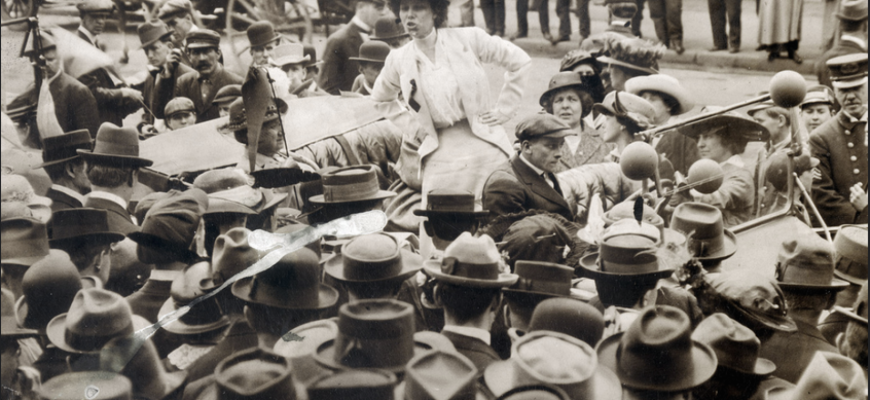On Memorial Day, 1919, with World War I fighting barely over, mothers of the 1,300 North Dakota men killed still wept for all that was lost. But another mother, alone in a cold prison cell in Missouri, felt a loss of another kind — she wasn’t being allowed to grieve at all.
She wrote this in a letter to her husband and four children:
“You know I am not given to tears. I was grieving from the sense of outrage that on that day, sacred to the memory of our dead that we women were denied the opportunity to pay tribute and were forced to slave all day at a machine making overalls for some politician’s profit.”
The woman was Kate Richards O’Hare who was serving a five-year sentence of hard labor at the Missouri State Penitentiary in Jefferson City. Her crime? Violating the Espionage Act of 1917 for making an anti-war speech in Bowman, North Dakota, just two years earlier.
Her case attracted national attention not just from advocates for free speech but for showcasing the influence of toxic politics in a small prairie state.
Who was Kate Richards O’Hare?
According to the Pioneer Trails Regional Museum in Bowman, North Dakota, “Kate was born in Kansas on March 26, 1876 as Carrie Katherine Richards.”
Her Civil War veteran father and mother raised O’Hare and her three siblings with Socialist ideals.

Forum archives
When she grew up and married she began work as a journalist for the Socialist newspaper the National Rip-Saw. When America entered World War I in 1917, O’Hare began traveling the country speaking out against the war.
That is what brought her to Bowman on July 17, 1917, where she was invited to speak at a theater in the small southwestern North Dakota town of 500 people. Tickets went on sale for 25 cents apiece.
According to historian Erling Sannes, there was every reason for O’Hare to believe she would be greeted warmly by some in Bowman.
“She was popular among farmers, for she could speak their language and understand their problems. Throughout the Great Plains she was a popular speaker,” Sannes wrote in “Queen of the Lecture Platform.”
Additionally, Sannes said O’Hare’s anti-war message was likely to be well received in Bowman as most North Dakotans in 1917 were opposed to the war.
Historian William Pratt even noted that North Dakota “had the strongest Socialist presence of any Northern Plains state.”

Library of Congress
Approximately 150 people attended her speech that summer day at the Cozy Theater. She was popular enough that some attendees had to stand outside to listen. And that must have been exhausting. O’Hare’s speeches could last as long as four hours.
According to Sannes, the speech in Bowman was the 76th time she had given it. There had been no problem the previous 75 times in other parts of the United States, despite the fact that government officials were often in the audience. But Bowman would be different, thanks in part to a heated feud between two families at opposite ends of the political spectrum.
James E. Phelan had a successful career with the Northern Pacific Railroad in Minnesota before settling in Bowman in 1907 where he became a successful banker and rancher. A conservative Republican with political aspirations, he soon butted heads with the Totten brothers.
According to the Pioneer Trails Regional Museum, “George Totten was a Republican while Edward Totten was a Democrat, but both held progressive views. George was the State Representative, Edward was the Bowman County Judge, and Edward’s wife Lillian was the Bowman County Postmistress.”

Submitted photo/Queen of the Lecture Platform/Erling Sannes
Sannes said it was Lillian’s appointment as postmistress that helped escalate the feud between the families. That politically appointed job had been controlled by Phelan and his allies for some time, but Lillian’s appointment indicated a shift in politics away from conservatives toward progressives. Phelan came out swinging. The Tottens responded. It got ugly and both parties were accused of libel as tensions grew hot.
It was about to bubble over as O’Hare came to town to give her speech. Edward and Lillian Totten chose to attend the speech and Phelan recognized an opportunity.
After the speech, Phelan turned in Lillian Totten for misconduct in her role as postmistress. He said not only was Lillian in attendance at the speech, she applauded O’Hare’s words and according to the Fargo Courier News, Lillian Totten and Kate O’Hare had dinner, visited and ‘hobnobbed’ together that night.
Phelan and his political allies said this made Lillian Totten “a traitor to the United States,” and she should be removed from her position at the Bowman Post Office.
At issue, were statements Phelan said O’Hare made comparing soldiers to fertilizer and their mothers to sows. He summarized her alleged comments this way.
“Any person enlisted in the army of the United States for service in France would be used for fertilizer and that is all that he was good for, and that the women of the United States were nothing more or less than brood sows to raise children to get into the army and be made into fertilizer.”
Inflammatory, for sure. But some, including O’Hare, claim those words were never spoken.

Submitted photo/State Historical Society of North Dakota/NDSU Archives/Digital Horizons
The Tottens argued that Lillian should not be removed as postmistress because Phelan’s accusations were the result of “political and personal animosity” over the Totten’s support of the Farmer’s Nonpartisan League. North Dakota Governor Lynn Frazier, the state’s first NPL governor, agreed and sent a telegram to the Postmaster General requesting Lillian not be removed since the matter was “purely political.”
But Phelan, undeterred, set off to Fargo to seek a federal indictment against Lillian Totten. It did not come. The grand jury in Fargo decided Lillian did nothing wrong by simply listening to O’Hare’s speech. However, a second grand jury indicted O’Hare for making the speech.
What exactly did O’Hare say?
On July 29, 1917, O’Hare was arrested in Devil’s Lake (where she was scheduled to make another speech) for violation of Section III of the Espionage Act of 1917. The charge claimed that the alleged words in her speech had interfered with the draft and recruitment of soldiers.
During her trial, the government found two witnesses who had been in attendance at O’Hare’s speech. One of them, J.E. James, agreed with Phelan. by testifying that he heard O’Hare make the “fertilizer and brood sow” statements.
But O’Hare vehemently denied the allegations. She said her supposed comments about “brood sow” related to something she said about how European countries at war who encourage soldiers to “breed before they die,” reduce women to the status of breeding animals on a stock farm. She said it had nothing to do with American mothers sending their sons off to war.
As far as the “fertilizer” comments, O’Hare also fought back and claimed these were her actual words from the speech:
“Our enemies tell you that we Socialists are hindering enlistment. This is not true! Please understand me now, and do not misquote what I say, ‘If any young man feels that it is his duty to enlist, then with all my heart I say: Go and God Bless you!’ His blood may enrich the soil of France, but that may or may not be for the best.”
Despite her arguments, O’Hare was found guilty. She was sentenced to five years of hard labor at a federal penitentiary under charges of sedition. With no federal penitentiaries for women, she was sent to the Missouri State Penitentiary in 1919.

Submitted photo/Library of Congress
But the effort to get her released started immediately. The Kate Richards O’Hare National Defense Committee announced plans to obtain the signatures of one million women to petition President Woodrow Wilson to reopen the case. Another group sent questionnaires to all 150 people in attendance at O’Hare’s Bowman speech. According to Sannes, “All but one or two stated that O’Hare absolutely did not use the words for which she had been condemned.”
The efforts worked and by 1920, she was officially pardoned by President Wilson.
But the damage to O’Hare’s reputation had been done. According to Sannes, the effects of what happened in North Dakota haunted her. “She was kidnapped in Idaho and deported to Nevada. In South Dakota and Kansas, she was not permitted to speak and agents from the Department of Justice continued to follow her and report on all of her activities”
Despite all of this, O’Hare seemed to have gained perspective about what she went through in North Dakota.
In 1936, 17 years after she was convicted she granted an interview to The Fargo Forum.
O’Hare told The Forum she had been in North Dakota four previous times before the time she was arrested in 1917, but that fifth time was different. The political climate was uneasy. The state was immersed in a battle between the Non-Partisans and the ‘stalwarts,’ which conveyed so much bitterness she said she was severely censored when she went to the wrong place of business to buy a soft drink before she delivered one word of her speech.
She said as far as ‘hobnobbing” with the Tottens, she said they simply met after O’Hare was sitting on the porch of her hotel showing pictures of her husband and children to a group of residents, one of whom was Lillian Totten.
O’Hare told the newspaper, “We spent a pleasant evening talking about educational affairs and taking care of children not realizing such a domestic scene would be a seditious gathering.”
Twelve years later, in 1948, after a career of politics and activism, Kate Richard’s O’Hare died in California securing her place, forever, in a very unusual chapter in North Dakota history.








